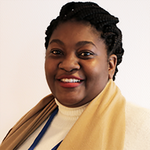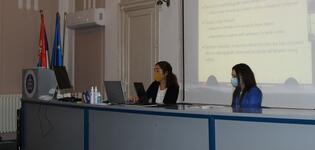Blog
Opportunities beyond lecture rooms – widening my career perspectives as a UNU-WIDER PhD fellow
It was surreal to take a springtime walk along the harbor in Helsinki on my way to UNU-WIDER’s headquarter offices for the first time. My initial application to the UNU-WIDER PhD Fellowship programme had been rejected. In 2021, I applied again and was genuinely surprised to be accepted —shocked actually. I figured my type of work (deeply theoretical) would not make the cut, but I was wrong. The application process is highly competitive with a low acceptance rate, so don’t give up if you want to attend. As UNU-WIDER Research Fellow Dr. Michael Danquah later put it, I had made ‘the top 2%’.
Looking back, it was a good thing I was not accepted the first time. I believe that I benefitted much more from the programme in the later stages of my PhD than I would have at the outset. I encourage anyone who is more settled into their research, and actively working towards PhD completion, to apply to the programme. If accepted, you will have a molding, eye-opening, and fun experience in a supportive space.
Companionship along the way
The PhD is often described as a lonely journey —it has sometimes even made me question my intelligence! Being at UNU-WIDER was a moment away from this loneliness. Sharing the space with fellow PhD candidates from different parts of the world was an enriching experience. It felt good to laugh about how similar our lives and journeys are, and to root for each other and learn from each other. It truly was a fellowship experience and I felt understood.
UNU-WIDER is a peculiar mixture of a research institute and think-tank. During my fellowship time, the institute’s calendar was richly packed with opportunities to participate in, for example, the Puzzle of Peace WIDER Development Conference and the Nordic Conference in Development Economics. These, among other functions, were great for networking and exposure to both established and upcoming researchers in various focus areas.
I am more accustomed to what I call the four walls of university life. Visiting UNU WIDER is in itself a reminder that other opportunities exist for academics outside of the lecture room or in pure research.
During the programme, I interacted with researchers whose career trajectories take different, but interesting routes. This exposure to different career paths and backgrounds gave me ideas about my own possibilities. I was also grateful to have conversations beyond the research work; particularly with my mentor, Dr. Abrams Tagem, which gave me confidence in my capabilities. Everyone at UNU-WIDER was open to having extended conversations and sharing a wealth of wisdom and experience.
A great setting to make progress
The UNU-WIDER offices are also an incredible environment. From the outset, I felt a warm welcome from the administrative team which transcended to the researchers and the other staff. I was supported in every aspect and the reception inspired confidence. I felt encouraged and heard as a peer, rather than stifled and small as a student. This allowed me to feel at home and truly benefit from the vast and deep pool of knowledge that makes the organization what it is.
Visiting Helsinki in the Spring-Summer months was wonderful. The offices are right by the harbor and a daily dose of the terrace, with to-die-for views of the sea, islands, and boats, is an added bonus. There is a wealth of opportunities to explore the city, the country and to partake in all other excursions —both social and work-related. I built several lifetime memories and, I sincerely hope, long-term friendships during my brief stay at UNU-WIDER.
My PhD topic is quite ambitious, I am often told. I focus on macroeconomic phenomena, while acknowledging that heterogeneity exists among economic participants. This is to acknowledge that people’s variable responses to shocks and other changes influence macro-outcomes. My work focuses on macroeconomic policy in an unequal society. As I continue my studies back at the University of Pretoria, my institution, I am fortunate to now have a bigger community to reach out to.
The author is a PhD student at the University of Pretoria in South Africa.
The views expressed in this piece are those of the authors, and do not necessarily reflect the views of the Institute or the United Nations University, nor the programme/project donors.
 Join the network
Join the network



